#PCT Survey
Explore tagged Tumblr posts
Link
The Best Pacific Crest Trail Moments in 2022 | The best moments on the Pacific Crest Trail recounted by the PCT Class of 2022 - from summits and towns to the people you meet on the trail.
2 notes
·
View notes
Text
More of the 2023 PCT Hiker Survey
In the current Halfwayanywhere's PCT survey there have been inquiries about ageism, homophobia/transphobia, racism, and sexism on the PCT. The data is notable in that even on the PCT these features of the greater society still appear significant. The PCT culture can appear to be utopian or maybe just the best one's imagined world has to offer. People seemingly get along, the surroundings are awe inspiring, and the experiences are hard to surpass.
In the latest Halfway generated 2023 hiker survey the results are extensive. In this post I would like to shine a little light on the results related to age, sexual identity, and race. When I reflect on my experiences on the PCT as the years have gone by I have felt more and more like my hiking partners and I are the 'geezers' based on the other hikers we have encountered on the trail. We have even referred to ourselves as 'Team Geezer' with our tongues firmly planted in our cheeks. We can't really say we have been victims of ageism. We could say we have surprised a few people when we share more of our trail story that ultimately leads to our ages. Age for us doesn't matter all that much.
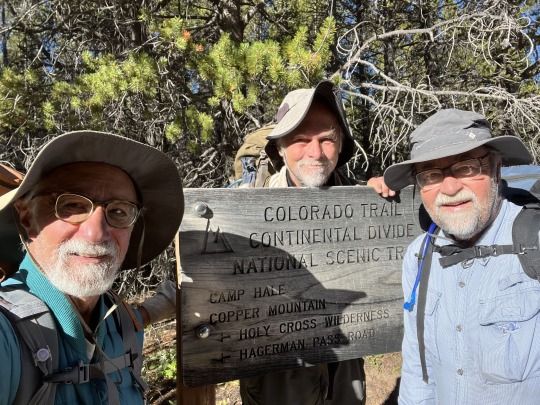
'Team Geezer' September 2023
Halfway's 2023 PCT hiker survey includes these comments and data.
Social Issues on the PCT
The Pacific Crest Trail is, for the most part, an amazing place filled with incredible people.
However, just as the trail itself can be not so amazing at times – thunderstorms, fires, horrific weather events – the people, too, can occasionally be awful on the PCT.
Ageism
Overall, 12.5% of hikers experienced ageism on the Pacific Crest Trail. 8.7% experienced ageism from other hikers, 1.0% from people in town, and 2.8% from both their fellow hikers and people in town.
*As ageism was reported by hikers with a wide variety of ages, these percentages encompass all hikers.
Homophobia/Transphobia
Overall, 42.4% of LGBTQIA+ hikers experienced homophobia or transphobia on the Pacific Crest Trail. 9.6% experienced homophobia or transphobia from other hikers, 22.4% from people in town, and 10.4% from both their fellow hikers and people in town.
Racism
Overall, 22.5% of BIPOC hikers experienced racism on the Pacific Crest Trail. 1.3% experienced racism from other hikers, 17.5% from people in town, and 3.8% from both their fellow hikers and people in town.
Sexism
Overall, 53.1% of women experienced sexism or sexual harassment on the Pacific Crest Trail. 12.8% experienced sexism or sexual harassment from other hikers, 15.4% from people in town, and 2.94% from both their fellow hikers and people in town.
These data points are intriguing to me. For one thing this data suggests that the PCT is a kind of microcosm of the larger world. Ageism, Homo and Transphobia, Racism not to ignore sexism lurk even on the trail and the towns hikers pass through. At the beginning I described this data as intriguing but I should also mention that it feels disappointing too. The PCT is a place where one likes to think a certain immunity exists from these threats, attitudes, and general misgivings. Nevertheless some of societies uglier features, based on the data, still weasel their way into people's hiking experiences
Ageism faired better than homophobia and transphobias where when the data is taken together 42.4% of LGBTQIA+ hikers noted some form of negativity about their identity/preferences. BIPOC hikers felt they experienced the most (17.5%) racism from townspeople. As more people of color get on the trail it may dampen another ugly societal feature. Sadly just over half the women who submitted their survey said they experienced sexism or sexual harassment on the PCT. Some of the sexism and/or harassment came not just from townspeople but fellow hikers too. The percentages are nearly even.
The PCT hiker surveys are valuable in so many ways. It seems that in looking over this particular data surrounding ageism, racism, sexism, and homophobia/transphobia, we can use it as a call to action. As members of the PCT community we must be reminded through the survey responses that the PCT is as susceptible to some of the same social shortcomings of the world found off the trail. If we can take that understanding and apply it toward actively working to change such attitudes then the trail can be a welcoming place for more individuals than the survey results currently suggest. We may have to wait for the next survey and the one after that before we will really know if greater acceptance and a willingness to understand others is taking place. How we measure our collective progress is yet another product of Halfway's valuable surveys. Stealing a little from Woody Guthrie...we cannot forget that 'this trail is your trail and this trail is my trail, it belongs to you and me...' In reality we don't own it but we are responsible for what happens both on and off of the PCT and that can be a real source of pride.
3 notes
·
View notes
Text
Dandelion News - December 8-14
Like these weekly compilations? Tip me at $kaybarr1735 or check out my Dandelion Doodles for 50% off this month!
1. Rooftop Solar Keeps Getting More Accessible Across Incomes

“The long-term trend is that the median income for a household with rooftop solar is getting closer almost every year to that of the median income for owner-occupied households.”
2. Endangered seabirds return to Pacific island after century-long absence
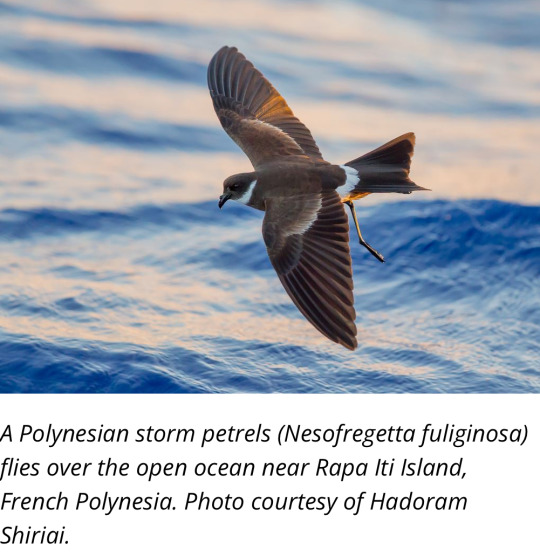
“"No native species were harmed during the removal of invasive rats from Kamaka Island,” Esposito said. […] The team also collected and planted native sedges and grasses while removing invasive trees to enhance nesting conditions.”
3. First-of-its-kind crew welfare measure adopted at Pacific fisheries summit
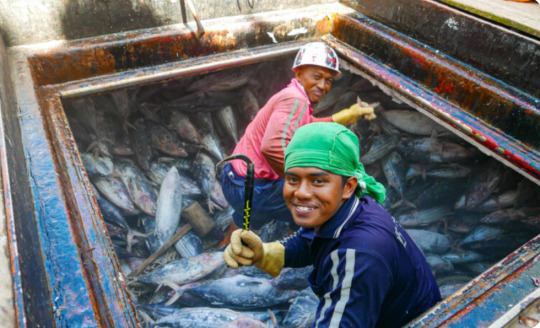
“The new measure establishes minimum standards on board, including access to clean food and water, medical care, and sleeping quarters. It stipulates that workers have “unfettered access” to their identity documents […] and “unmonitored access to communication devices to seek assistance.””
4. Greyhound racing is increasingly rare worldwide. New Zealand now plans to outlaw the practice

“New Zealand’s government rushed through a law to prevent dogs from being killed while the industry winds down, unless a veterinarian deems it unavoidable. This will prevent owners from euthanizing dogs for economic reasons, Peters said.”
5. Possible Win-Win for Wildlife Management and Food Security
“Wild-harvested meat donation programs can help improve food insecurity while also helping manage overabundance of wildlife species like white-tailed deer[…. In one program,] hunters donated 600,000 meals. But that’s only 5.7% of the amount of venison that food donation facilities could use, according to the Food Bank Council of Michigan. The researchers say this suggests there’s room for scaling up these programs.”
6. Poll of American Farmers Shows Strong, Widespread Support for Increased Farm Bill Conservation Funding

“The polling, which surveyed over 500 farmers and ranchers across the country, found broad support for continuing and increasing funding for climate-smart agriculture conservation programs.”
7. Long-distance friendships enhance trust in conservation efforts
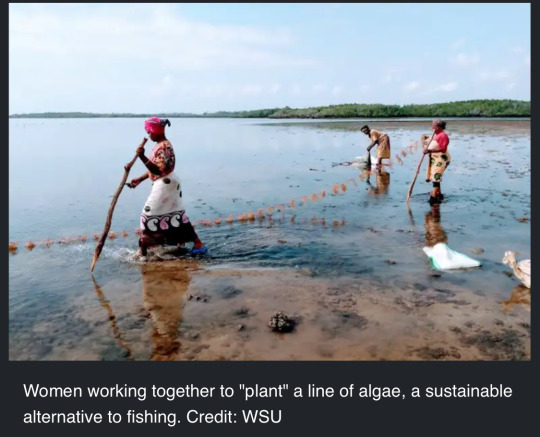
“Relative to a person with no long-distance friends, having even just one friend in another village led to a 15% increase in conservation activities such as beach cleanups, reporting illegal fishing practices and educating others about sustainable resource management.”
8. Two major Sunshine State airports make switch to 100 pct renewables
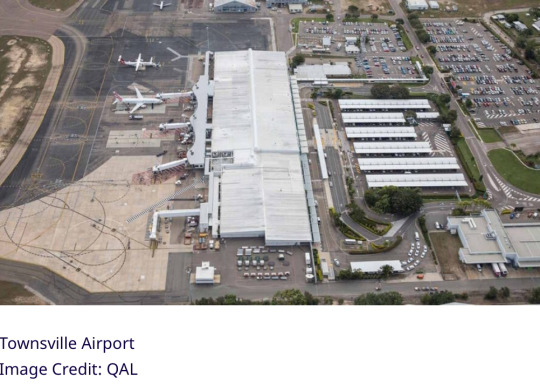
“Power for operations ranging from lighting and air conditioning to escalators and charging stations will be provided from renewable energy projects [...] at the beginning of 2025, ensuring clean energy operations for the more than 8 million passenger journeys averaged each year.”
9. Expansion of federally subsidized public housing may offer a path out of LA's homelessness crisis

“[… A] half-cent sales tax [was] recently approved by L.A. County voters expected to generate $1 billion per year to address homelessness. […] “Metros with higher concentrations of federally financed public housing tend to have lower rates of unsheltered homelessness," Schachner said.”
10. $20 Million Available to Advance Habitat Restoration Priorities of Tribes and Underserved Communities
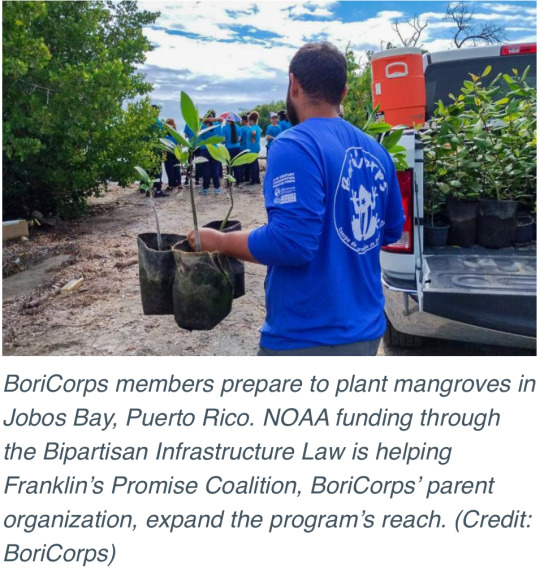
“Through this funding, NOAA will help support community-driven habitat restoration and build the capacity of tribes and underserved communities to more fully participate in restoration activities.”
December 1-7 news here | (all credit for images and written material can be found at the source linked; I don’t claim credit for anything but curating.)
#hopepunk#good news#solar#solar panels#solar power#rooftop solar#income inequality#low income#birds#conservation#invasive species#human rights#workers rights#fishing#dogs#greyhound#tw dog death#tw pet death#dog racing#hunting#farmers#climate#climate action#community#renewableenergy#airport#unhoused#homelessness#noaa#habitat restoration
65 notes
·
View notes
Text

🇺🇲 🏦 🚨 U.S. RETAIL SALES DOWN 3.1 pct YEAR-ON-YEAR FROM 2022
U.S. retail sales, excluding consumer vehicles, grew 3.1% year-on-year for the period from Nov. 1st 2023 to Dec. 24th 2023, according to preliminary data from the MasterCard Spending pulse report issued on Tuesday.
Previously, the U.S. economy recorded a 7.6% year-on-year expansion, writes Xinhua News Agency.
In further detail, online retail sales grew by 6.3% year-on-year, while brick-and-mortar retail only grew by 2.2% year-on-year.
Restaurant sales saw a year-on-year expansion of 7.8% for the same period, while sales in Jewelry shrank by 2% and sales in electronics were down 0.4%.
Data was based on non-inflation adjusted aggregate sales activity from the MasterCard payments network in combination with survey-based estimates for certain payment forms including cash and check.
Further, the U.S. National Retail Foundation forecast for holiday spending for Nov. and Dec. 2023 expected growth of a projected 3-4% over 2022 to between $957.3 billion to $966.6 billion.
#source
@WorkerSolidarityNews
#united states#us economy#us retail sales#us news#news#politics#economy#economy news#wall street#economics#economics news#geopolitics#world news#global news#international news#breaking news#current events#business#business news#us business#us business news
6 notes
·
View notes
Text
PCT Patent Application in Texas- Master Counsel and Meeting
Getting worldwide patent security is an essential move for innovators and organizations intending to enter worldwide business sectors. One of the best ways of accomplishing this is through the Patent Participation Deal (PCT) application process. If you are situated in Texas and hoping to explore the intricacies of PCT applications, master counsel and discussion can be priceless. In this article, we will investigate the PCT Patent Application in Texas process, its advantages, and how to track down the right proficient help in Texas.
Understanding the PCT Application Interaction
The Patent Participation Deal (PCT) is a worldwide patent regulation settlement laid out in 1970. It gives a bound-together methodology for documenting patent applications to safeguard creations in numerous nations. A solitary PCT application can be documented in one language, and it can cover various nations, working on the cycle for creators and organizations.
Key Stages in the PCT Application Cycle
Recording the PCT Application: The cycle starts with documenting a PCT Patent Application with a getting office, for example, the US Patent and Brand Name Office (USPTO) on the off chance that you are situated in Texas. This application should be documented in no less than a year of the underlying patent application (if a need date is guaranteed).
Global Pursuit: When recorded, a Worldwide Looking through Power (ISA) conducts a hunt to recognize earlier workmanship pertinent to the innovation. The ISA then gives a Global Pursuit Report (ISR) and a composed assessment of the innovation's patentability.
Distribution: Roughly a year and a half after the need date, the PCT application is distributed by the World Licensed Innovation Association (WIPO). This distribution incorporates the ISR and makes the application accessible to people in general.
Worldwide Fundamental Assessment (Discretionary): Candidates might demand a global primer assessment, which gives a second assessment of the development's patentability. This is especially helpful assuming the underlying composed assessment is ominous.
Public Stage Section: Within 30 or 31 months from the need date, the candidate should enter the public stage in each ideal country. This includes presenting the PCT application to the public or local patent workplaces and satisfying their particular prerequisites, including interpretations and expenses.
Advantages of Documenting a PCT Application
Documenting a PCT application offers a few benefits for innovators and organizations:
Financially savvy: Rather than recording separate patent applications in every country, a PCT application considers a solitary documenting, diminishing starting expenses and regulatory weight.
Expanded Course of Events: The PCT cycle gives up to 30 or 31 months from the need date to choose which nations to seek patent assurance in. This lengthy timetable is valuable for surveying the business capability of the creation in various business sectors.
Unified Administration: The PCT framework offers a concentrated method for overseeing global patent applications, smoothing out the interaction and decreasing intricacies related to numerous locales.
Key Navigation: The ISR and composed assessment give important bits of knowledge into the patentability of the development, permitting candidates to settle on informed conclusions about seeking security in unambiguous nations.
Tracking down Master Counsel and Discussion in Texas
Exploring the PCT application interaction can be trying without proficient direction. Patent lawyers and specialists with experience in worldwide patent regulation can give the skills expected to boost the advantages of the PCT framework. Here are some moves toward tracking down the right proficient help with Texas:
Look for Specific Patent Lawyers
Search for patent lawyers or specialists who work in PCT applications and global patent regulation. These experts have the information and experience to deal with the intricacies of the PCT cycle.
Assess Insight and History
Take a look at the lawyer's involvement in taking care of PCT applications, including their prosperity rate and the ventures they have worked with. A solid history demonstrates their capacity to explore the cycle and secure licenses in various nations.
Think about Nearby Skill
While the PCT cycle is worldwide, having a patent lawyer situated in Texas can offer benefits, for example, experience with the USPTO strategies and the capacity to give face-to-face discussions.
Search for Straightforward Evaluating
Understanding the expense structure is critical when picking a patent lawyer. Search for experts who offer straightforward evaluation and can give a point-by-point gauge of the expenses engaged with the PCT application process.
Peruse Client Tributes
Client tributes and surveys can give bits of knowledge into the lawyer's impressive skill, relational abilities, and viability. Search for criticism from clients who have recorded PCT applications to measure their fulfillment with the administrations given.
Plan Conferences
Many patent lawyers offer beginning interviews to talk about your development and the PCT application process. Utilize this chance to clarify some pressing issues, assess their skill, and decide whether they are an ideal choice for your requirements.
The Job of the Affordable Patent Agency
For designers and organizations in Texas, the Reasonable Patent Organization offers master counsel and discussion for PCT applications. Represent considerable authority in savvy patent arrangements, the Reasonable Patent Office offers customized assistance and far-reaching support all through the PCT cycle.
Administrations Presented by the Affordable Patent Agency
PCT Application Documenting: Help with planning and recording PCT Patent Applications in Texas, guaranteeing consistency with all necessities.
Patent Inquiries and Assessments: Leading exhaustive patent ventures and giving assessments to survey the patentability of your creation.
Methodology Improvement: Fostering a smart course of action for entering the public stage in chosen nations, custom-made to your business objectives and financial plan.
Progressing Backing: Offering continuous help and exhortation all through the patent interaction, from documenting to the public stage section.
End
Documenting a PCT application is an essential move for innovators and organizations hoping to safeguard their developments universally. With the right proficient direction, the interaction can be productive and financially savvy. If you are situated in Texas, and looking for master guidance and conferences from particular patent lawyers or organizations like the Reasonable Patent Organization can assist you with exploring the intricacies of the PCT framework and secure hearty patent assurance for your developments. Venture out towards worldwide patent security by talking with specialists who grasp your necessities and can direct you through the interaction with certainty.
#PCT Patent Application in Texas#PCT Patent Application#Patent Agent in Texas#Affordable Patent Attorney#Cheap Patent Attorney#Affordable Patent Agency
0 notes
Text
Equip Letroxyl for sale for best post cycle treatment

Post-cycle therapy (PCT) is a method used by professional bodybuilders to counteract the harmful effects of regular steroids. Letroxyl for sale is a useful compound used in PCT and it is popular for its ability to counteract estrogenic side effects, such as man boobs and acne. It helps lower estrogen levels, prevents negative effects, preserves lean muscle mass, and promotes hormonal balance. For more details click:
https://medium.com/@fitnessavobeall/equip-letroxyl-for-sale-for-best-post-cycle-treatment-1a2ca35f159c
0 notes
Text
Over 60 pct of large firms expect exports to grow in H2: survey
http://dlvr.it/T93GQD
0 notes
Text
Equip Letroxyl for sale for best post cycle treatment

Post-cycle therapy (PCT) is a method used by professional bodybuilders to counteract the harmful effects of regular steroids. Letroxyl for sale is a useful compound used in PCT and it is popular for its ability to counteract estrogenic side effects, such as man boobs and acne. It helps lower estrogen levels, prevents negative effects, preserves lean muscle mass, and promotes hormonal balance. For more details click:
https://sites.google.com/view/letroxyl-for-sale/for-best-post-cycle-treatment
0 notes
Text
Mount Eddy Backpack (2/2)
I'd fallen asleep to a clear sky and a calm night in the Upper Deadfall Meadows. I woke up - a few hours later, just after midnight - when the tent wall slapped me hard in the face. Sticking my head out of the tent, I could barely make out the lake, fifty feet away: everything was shrouded in fast-moving fog, carried by a howling wind.
A few years ago, this would have been a disaster for me. Fortunately, I've spent enough nights in inclement conditions since that while the sound and feeling of the wind trying to lift my tent off the ground - as well as the occasional fabric-slap in the face - makes it hard to sleep well, it doesn't make it impossible. My brief survey of the world outside the tent didn't reveal any rain or snow, just wind and fog, and so I did my best to sleep through the rest of the night, and I...mostly succeeded?
It didn't get that cold overnight despite bad the weather - there had certainly been much colder nights weeks earlier in the Sisters Wilderness, plus I'd packed a heavier sleeping bag this time around - but the wind made the morning chilly and miserable. IT'S NEVER A GOOD IDEA FOR SAFETY REASONS SO DON'T DO IT but I cooked my breakfast on the ground inside my tent's vestibule and did literally everything I could possibly do to get ready for the day without leaving my sleeping bag, then rushed to pack up the tent and bag last before my hands and feet went numb in the gale. I didn't bother to wait for the sunrise because the weather was so bad it wasn't like the sun was going to make anything warmer.
I took a darkly amusing picture of Upper Deadfall Lake before heading out because it looked so completely different than it had the previous afternoon when I'd set the tent up.
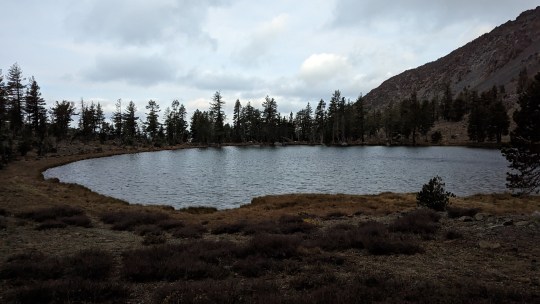
My plan for the day, which I didn't expect the weather to complicate much once I got moving and warmed up, was to climb back up to the intersection with the Eddy summit trail, but then descend on the Deadfall Lakes Trail to the south. That trail would eventually bear to the east and become the Sisson-Callahan Trail, a trail built over an old wagon road from the 1800s that I'd always wanted to walk a bit of. After a short distance, I would turn south again on the Toad Lake trail, which would take me over a low pass and (you guessed it) to Toad Lake. From there, I could climb up and out of the Toad Lake basin, hook back on to the PCT, (optionally) make a stop at Porcupine Lake, and then head north for a few miles until I found myself back at Middle Deadfall Lake. From there, I would take the lower trail to the Deadfall Lakes Trailhead and then walk the one mile up the road back to my car at Parks Creek. This is, actually, mostly what happened. As usual, it was more interesting than I'd expected. But hey, that's backpacking for you.
I'd been to Toad and Porcupine Lakes before, via the PCT from the south, but everything before and after those lakes would be new hiking for me, which I was really excited about. The first mile or so of the "new" part of the hike was a steep but well-graded descent into the valley south of Eddy. This valley is apparently the origin of the North Fork of the Sacramento River, which is insane and something I literally just learned while looking at a map as I wrote this. Knowledge!
The sunrise kicked off in earnest during this descent, and that combined with the blood finally bringing my hands and feet back to life made this an exceptionally enjoyable bit of hiking.
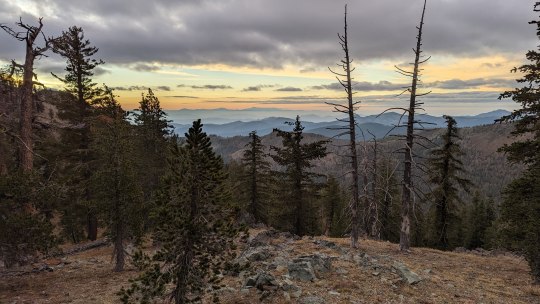
I latched on to the Sisson-Callahan Trail as planned, took it to where the Toad Lake Trail was supposed to begin...and there was no trail to be found. Now, ten years ago I would have absolutely believed that I was just too dumb to see the trail. Nowadays, though, I've got more than enough bushwhacking and orienteering experience under my belt that after fifteen minutes of searching I was confident in my conclusion that there was no Toad Lake Trail. Hm.
I took a break to think. I could choose to go back the way I came, hike back out to the car the "normal" way, and just have a short, straightforward day. I could continue in the direction of the Toad Lake Trail and hope that, eventually, it might become visible. I couldn't keep following the Sisson-Callahan Trail, though: it went due east, the exact opposite of the direction the car was in.
After thinking and studying the map a bit more, I realized that all "the Toad Lake Trail" did on my map was contour south and west around a hill, climb to a saddle between the summit of that hill and the next one over to the west, and then descend just east of a sharp ridge nearly due south before striking the road to the Toad Lake Trailhead. The country in that direction looked extremely open and easy to traverse, and based on the map would not be that difficult to navigate using landmarks and a compass (if for some reason my phone died). If I got turned around, it would add a lot of time and distance to what was already going to be a really long day, but it was my last day of backpacking in 2023. Why not go for it?
I left the Sisson-Callahan trail and struck off through the trackless forest to the south.
Well, the climb up to the saddle - nearly eight hundred feet above - turned out to be harder than I'd expected due to the loam-y nature of the dirt underneath my feet, but navigating was incredibly straightforward. I never found a trail to speak of, but what was extremely strange was that I occasionally came across a human-made cairn where the trail should have been. My best guess is that the trail once existed, grew over due to lack of maintenance/use, and at some point in that process people had tried to keep it usable by marking it using the cairns that still stand (sans trail) today.
Anyway, I wouldn't necessarily recommend taking this route, but it's certainly possible if you know how cardinal directions work and can navigate by landmarks. Oh, and the view from the unnamed saddle was really great, even though it exposed me again to the gusty wind that the valley had sheltered me from for the previous hour and change.
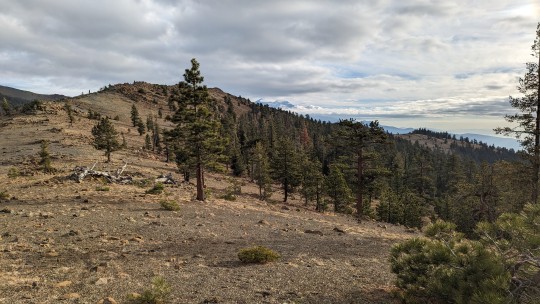
Well off-trail at this point, unsure of how easy it would be to find my way to Toad Lake, and unnerved by a lot of recent-looking bear scat and prints, I did what any self-respecting modern hiker would do in such a circumstance: I called my wife on the phone and told her where I was in case I died.
I actually wasn't particularly freaked out about this until I made the call: I had a good sense of where I was going, the area was open enough that I wasn't going to accidentally sneak up on or scare a black bear, etc., but I had given Lindsey a particular itinerary when I left the house and now that I understood that the real world didn't feel like matching that itinerary, I wanted to file an update.
That said, I ended the conversation more nervous than I'd started it, as if speaking out loud the possibility of getting lost and/or mauled made it more likely. I barrelled down the backside of the hill into the teeth of the wind, eyes scanning for large, black shapes (of which there were many; all stumps though).
Eventually, after descending a final hill that I slid down on my butt due to it being a washed-out sixty-degree-or-so drop, I hit the Toad Lake road. This wasn't a paved road, but was a clear double-track path, so I took it west. One would think that following this road would be easy and lead one directly to the Toad Lake Trailhead, but alas! It was not that kind of day.
Somehow, I ended up to the south of the road proper despite still being on a double-track path...that eventually dead-ended into a marshy area that was the shore of the (in case you're keeping score at home) Central Fork of the Sacramento River. More bushwhacking ensued before I regained the road proper and then, finally, saw Toad Lake in the distance.
I'd only ever visited the west side of the lake before, and in my semi-aggravated state it seemed to take forever to circumnavigate around to the west side from the southeast, but I did it. There's a pretty steep climb out of this lake basin up to the PCT here, but I was so excited to get to the PCT (and, presumably, a world that made navigational sense again) that I barrelled up it without much trouble. Behind me was a nice view of Toad Lake, which I believe after this trip gets better the further you get away from it.
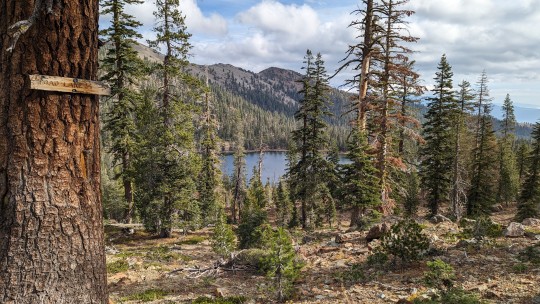
Despite all my navigational misfortunes and missteps, I was still a bit ahead of my worst-case-scenario schedule, so I took a quick detour south on the PCT to Porcupine Lake.
I'd dayhiked here a few years ago from the south with Lindsey and a friend of ours, and it was a gorgeous little alpine lake in the summertime. It was a bit less photogenic during this moody fall day, but it was still a great place to take an extended lunch break - my first real rest since before realizing that the Toad Lake Trail did not, in fact, exist.

Despite being embedded somewhat in a basin of its own, Porcupine Lake was still exposed to the howling gale. This proved to be a problem, as the food I'd kept back for lunch was a small dehydrated meal leftover from earlier in the season. It was windy enough that it was flat-out impossible to keep my stove lit even behind the biggest tree I could find...so I took fifteen minutes to build a large rock cairn/"oven" to hide my stove in. It wasn't funny while I was doing it, but it was afterward, and it worked!
Finally, about an hour after I'd reached the lake, but much better rested, happier, and fuller, I headed back out to the PCT and turned north. My navigation troubles were over for the day, and I was excited to see what this small, new-to-me stretch of the PCT would show me before wrapping up backpacking for the year.
At first, the trail contoured around the edge of the Toad Lake basin. This provided some great, high-up views of the lake, as well as a few short-but-surprisingly-sketchy traverses. Eventually, the PCT looped out to the east around a high point and I got a great view of Shasta in the distance, along with the valley I'd descended down into that morning.

The views were great along this section, and eventually I also got to see a perspective on Eddy I'd never seen before.

Now heading due north and approaching one final pass, the PCT took me through my favorite bit of hiking that day: a slightly-but-not-too-sketchy traverse through cliffs of "Red Trinities" peridotite.

At the top of this pass was one last view back toward the valley I'd traversed earlier in the day, and from this vantage I could see where I'd climbed down from Upper Deadfall Meadows as well as where I'd crossed the Saddle Of Phantom Bears. It was a neat moment.
From there, the PCT headed two more miles north through relatively straightforward terrain that, to me, in my cold, tired, and footsore state, seemed positively torturous. Once the trail turned back toward the Middle Deadfall Lake basin, though, there was a neat, rocky section that provided another new (and great) view of Eddy.
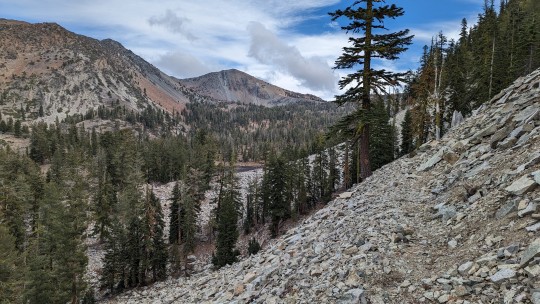
I walked toward it for a bit, and then, suddenly, I was back at Middle Deadfall Lake.

It, too, suffered a bit in comparison to yesterday's version, though there were still a few of the same campers riding out the weather on the opposite shore, the wind visibly tearing at their tents. I didn't stay here long.
As planned, rather than doubling back directly to the Parks Creek trailhead, I headed downhill at the big intersection, toward the lower Deadfall Meadows. The original draw here had been variety: I love this area and wanted to see it once before the year was out. It wasn't, in theory, a hardship to hike the mile up the road afterward to get to my car.
In practice, it had been a long day already, and though I'd thoroughly enjoyed adventuring along new trails (and non-existent trails of LIES), I was ready to be done. The trek downhill and through the marshes was just as pretty as I'd remembered - albeit featuring less sun and babbling brooks that you'll find there in the summer - but to be honest I was mostly on autopilot at this point, just zoning out mentally as I physically steered my body back to the car by rote.
I think I confused a few people who were loading up at the Deadfall Lakes Trailhead when I resolutely hiked past them and continued on and up the paved road on foot. They passed me in their car a few minutes later, slowed down slightly as if to stop, but then didn't.
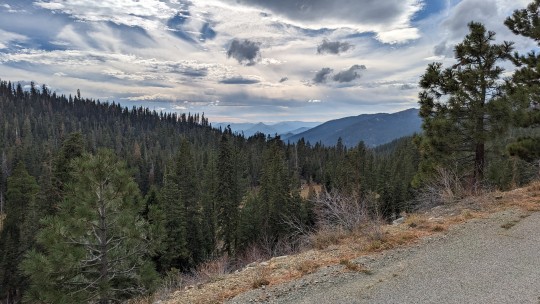
I spent the walk up the road musing over what hidden, subtextual message there was to be found in the fact that the last mile of the hundreds I'd hiked this season was taking place on a paved road, with cars roaring past me as I climbed, the roaring of their engines overpowering even the sound of the wind. I couldn't come up with anything. I didn't feel like any of my experiences had been dire or alienating enough for this last, weird mile to serve as some sort of sarcastic referendum.
I'd had a great season, all things considered. There were, of course, ten or twenty other places I would have loved to have gone to and seen given more time, but that will always be true. I would have liked to have gotten to spend more time in the Trinities instead of having them closed for most of the summer due to fire, but hopefully next summer will be better, and safer.
Whatever else happens, I know I'll keep doing these hikes until I physically can't anymore, and even then there will be places I'll be heartbroken to have never seen, or to have not gotten to see again. But that's okay, because that's how walking works, at least if you're doing it right: you never get to the end, because there isn't one. You just keep walking.
#backpacking#camping#hiking#mountains#mount eddy#northern california#mount shasta#trinity alps#photos#writing#traveling
0 notes
Link
Discrimination on the Pacific Crest Trail (Class of 2022) | According to the Pacific Crest Trail Class of 2022 Survey, discrimination on the PCT in 2022 was not too infrequent - here are the details.
0 notes
Text
Trash on the Trail -- What's Out There
Bandages, balloons, bullet casings: Here’s how much trash is on the Pacific Crest Trail
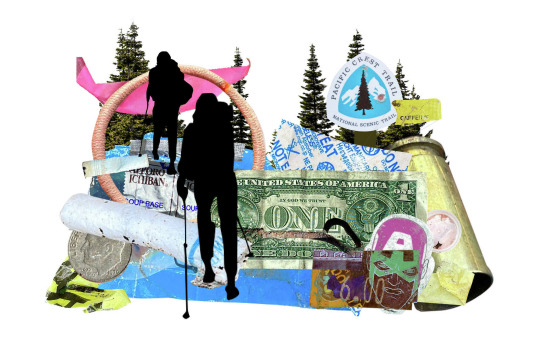
A pair of environmental scientists who thru-hiked the trail last year conducted the largest known and most comprehensive survey of litter on the Pacific Crest Trail. Illustration by Sophie D'Amato/The Chronicle from No Trace Trails elements.
Their findings reflected my own perception of trash on the PCT. The litter I have encountered does seem to be concentrated around highway crossings, campgrounds, trailheads, and high-use areas with easy road access. The issue of toilet paper along the trail is a more complicated issue . . . one that seemingly combines awareness, behavioral change, and some infrastructure support.
ByGregory Thomas and Harsha Devulapalli
Roughly 1 million people per year venture onto the wild and scenic Pacific Crest Trail, the 2,650-mile hiking route that winds through the West Coast’s soaring mountain ranges between Mexico and Canada.
That includes hikers out for a day in the woods, backpackers on multiday trips and thru-hikers seeking to conquer the whole thing in one long trek. Inevitably, some of those nature lovers leave behind micro-trash and bits of plastic litter. No one has sought to quantify the impact of trash on the trail — until now.
A pair of environmental scientists who thru-hiked the trail last year conducted the largest known survey of litter on the PCT, providing a sharp look at the kinds of materials people leave on the trail, in what concentrations, and where. The project was carried out, mile by mile, by Tori McGruer, 29, who holds a doctorate in environmental toxicology, and Macy Gustavus, 25, who holds a master’s degree in watershed sciences.
Here’s what they found.
A look at a few of McGruer and Gustavus’ findings
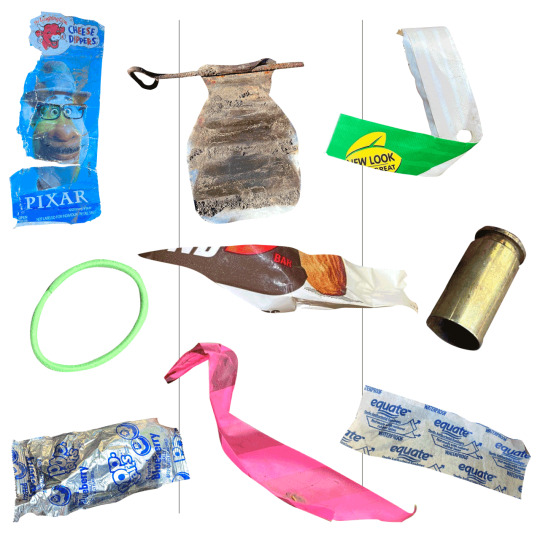
Graphic by Sophie D'Amato/The Chronicle from No Trace Trails elements
© OpenMapTiles© OpenStreetMap contributors
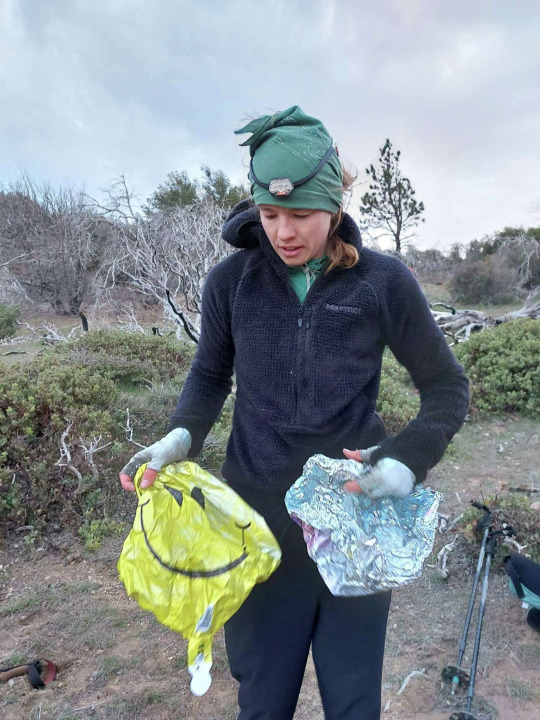
McGruer and Gustavus started their journey in March 2023 in Campo (San Diego County), near the Mexican border, the launchpad for northbound thru-hikers. They’d secured $16,000 in funding through grants and partnerships, quit their jobs and hit the trail.
From the get-go, they found significant concentrations of litter — bottle caps, gum wrappers and rubber fragments.
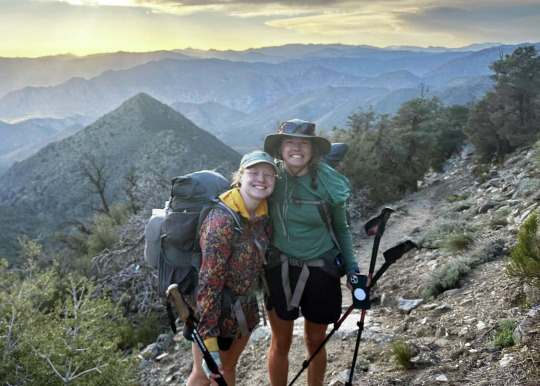
Over the next six months, McGruer (right) and Gustavus hiked the full 2,650-mile trail, which crosses the High Sierra and the Cascade Range, to the Canadian border. They cataloged — and usually collected — more than 1,000 pieces of trash. They found lots of snack wrappers, used toilet paper, Band-Aids and cigarette butts as well as novelties like Mylar balloons, a spent shotgun cartridge and a rusty horseshoe.

The researchers surveyed 1-kilometer segments of trail at 10-mile intervals — a total of 260 survey areas ● (a rate of about 2-3 per day). Each hiker scoped for litter on her respective side of the trail to a distance of about 6 feet from its center.
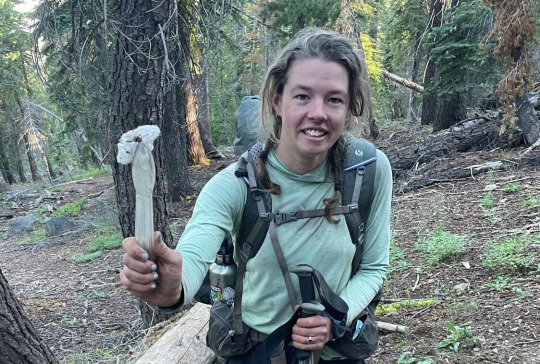
They handled trash objects with plastic salad tongs for sanitary reasons and deposited them into waterproof stuff sacks, “so if there was something gross we could put it in there and not worry about it leaching out,” McGruer said.
Certain heavy or cumbersome items, like pieces of an abandoned car, were cataloged but left on the trail. They categorized each item using Rubbish, a mobile app that helps users organize and geolocate litter in open spaces.
So, the dirtiest stretch of the entire trail?
A long segment bookending the San Gabriel Mountains on the outskirts of Los Angeles was the dirtiest of the entire PCT, presumably due to its proximity to a major metropolis. One-third of all the trash the researchers logged during their trip came from this region.
A few survey areas there contained hundreds of litter items. However, the researchers set a 100-item maximum when counting litter in a given survey area. When they hit that threshold, they believed they could extrapolate the trash concentration with reasonable accuracy, they said.
Mylar Balloons
Those shiny, metallic, helium-filled balloons are remarkably durable and capable of floating long distances. Strangely, they are winding up in remote wilderness areas at a rate that is concerning to biologists, as the Chronicle has recently reported.
McGruer retrieved several of them in the Southern California desert — one stuck in a patch of bushes, another submerged in a river. Survey aside, she made it a personal mission to remove the ones she found.
“One day I had like three partially inflated ones attached to my pack and someone passing us on the trail said ‘happy birthday’ to me,” she said.
The researchers found trash in about 60% of the 260 survey zones, meaning 40% contained no discernible litter. The hot spots along the trail tended to correlate with areas of easy access and high human traffic like highway crossings, campgrounds and day-use areas.
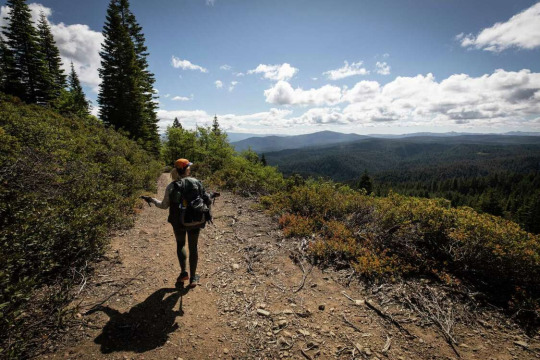
Brian Feulner/Special to the Chronicle
Many of the zero-trash areas were in remote mountain regions like Northern California’s High Sierra and Washington’s Cascade Range, where few people set foot.
That finding tracks with the experience of Jack Haskel, trail information manager for the Pacific Crest Trail Association, which maintains the trail on behalf of the U.S. Forest Service.
“Much of the trail is pretty pristine regarding trash but you do find hot spots where there’s a lot of it,” he said.
The most common trash materials found were: soft plastics, such as bits of bar wrappers or cuts of duct tape; hard plastics like water bottles and broken trekking pole baskets; brass bullet casings; paper shreds and used toilet paper; cigarette butts; and miscellaneous fragments.

In many instances, researchers encountered single pieces of stray trash, one at a time. But sometimes they’d find dozens of pieces of litter linked to a single event. For instance, in the backcountry of Shasta County they found 50 or more strands of tree-flagging tape used by foresters scattered on the ground.

What’s that?
In some cases, differentiating rubbish from natural ground materials was challenging. Identifying and classifying objects required four of the five senses — sight, smell, touch and, at one point, taste.
Unsure about the makeup of a smooth chunk of translucent detritus they found in the dirt –— was it plastic? glass? a natural mineral? — Gustavus popped it into her mouth and bit down. Glass, she decided.
“That’s not common,” Gustavus said. “I don’t encourage people to do that.”

Toilet paper
Used toilet paper left along the trail — half-buried, stuffed under a rock, clinging to bushes — is the PCT’s single, stand-out trash problem, according to Haskel of the Pacific Crest Trail Association. It is a gross, unsightly bane of trail rangers and volunteer stewards. The trash researchers found a lot of it — particularly in the northern states.
“In Oregon and Washington there was toilet paper everywhere,” McGruer said. “I was like, what is happening?”
In lieu of using a toilet, backpackers and hikers should bury their waste several inches deep in the ground, or use a wag bag and carry it out, and take their soiled toilet paper with them. Poop carries toxins and bacteria that, even when buried, can leach into nearby water sources and infect wildlife, Haskel said.

Biodegradables
Sunflower seeds, pistachio and peanut shells, orange peels — the researchers found them scattered along the entire trail route, and seeing them drove Gustavus “absolutely insane.” Yes, they should technically break down over time, she said, but hikers shouldn’t feel free to dump them in the natural environment.
“It’s kind of a misguided principle,” Gustavus said. “That stuff does not belong out there.”
Pictured: Pistachio shells on the trail in the mountains of Washington State.
The pair completed their thru-hike in September 2023. McGruer (left) and Gustavus are shown here at the PCT's northern terminus in the remote mountains where Washington State meets Canada.
It’s important to note that many PCT users actively beautify the trail each year.
Local volunteer groups, rangers and backpackers are all known to pick up trash they encounter on their outings as a simple act of altruism. Also, eight years ago a pair of young men made it their mission to remove the junk they encountered during their thru-hike; they ended up with more than 700 pounds of stuff, including a mattress.
Extrapolating from their data, McGruer and Gustavus estimate there to be about 200,000 pieces of trash along the trail at any given moment. But that’s not to say the trail feels trashy, McGruer said.
“We frequently saw trash, but often there would be a small piece in one of our 1-kilometer surveys. You wouldn't register that as a ton of trash,” she said. “I think what our survey findings say is that people leave a trash footprint wherever we go with these materials that really don't break down in the environment.”
The survey project, which the researchers dubbed No Trace Trails, was supported by grant funding and financial backing through the Moore Institute for Plastic Pollution Research in Long Beach via the Richard Lounsbery Foundation in Washington, D.C., and the American Alpine Club.
McGruer and Gustavus are putting together a research manuscript for peer review. They’re also seeking funds to help analyze the microplastic content of a series of soil samples they collected during their hike.

Sarah “Mountain Goat” Steinbauer from Austria hikes the Pacific Crest Trail near Quincy (Plumas County) on June 19, 2023. The heavy snowfall in the Sierra Nevada that year created special challenges for thru-hikers along the PCT. Brian Feulner / Special To The Chronicle
Credits
Reporting by Gregory Thomas. Reporting and graphics development by Harsha Devulapalli. Editing by Yoohyun Jung and Kate Galbraith. Design, development and illustration by Sophie D'Amato. Design editing by Alex K. Fong. Visuals editing by Ramin Rahimian. Powered by the Hearst Newspapers DevHub.
9 notes
·
View notes
Text
Automotive Tow Bars Market Analysis, Size, Growth, Competitive Strategies, and Worldwide Demand
Latest business intelligence report released on Global Automotive Tow Bars Market, covers different industry elements and growth inclinations that helps in predicting market forecast. The report allows complete assessment of current and future scenario scaling top to bottom investigation about the market size, % share of key and emerging segment, major development, and technological advancements. Also, the statistical survey elaborates detailed commentary on changing market dynamics that includes market growth drivers, roadblocks and challenges, future opportunities, and influencing trends to better understand Automotive Tow Bars market outlook. List of Key Players Profiled in the study includes market overview, business strategies, financials, Development activities, Market Share and SWOT analysis are:
Curt manufacturing LLC (United States)
David Murphy Towing (Ireland)
Parkside Towbars (Trimas corporation) (Australia)
Acps automotive GmbH (Germany)
Horizon global corporation (United States)
Brink group B.V. (Netherlands)
Hayman Reese (Australia)
Mccabe Towbars (Ireland)
North Shore Towbars (New Zealand)
PCT Automotive Limited (United Kingdom) More than 50% of the automotive tow bars sales come from North America and Europe. The US, being the worst affected country by COVID-19, has resulted in the shutdown of automotive plants and situation in the EU still remains critical and has faced a production loss of more than 1.5 million vehicles, which has directly impeded the sales of automotive tow bars.
Key Market Trends: The economic growth of North America has positively impacted the sale of commercial vehicles and passenger cars Opportunities: The presence of prominent automotive manufacturers and component manufacturers is propelling the automotive tow bars market value Market Growth Drivers: Growing disposable income of various developing countries, together with a high demand for adventure and use of caravans and motorhomes Challenges: COVID-19 outbreak has created multiple challenges for the automotive industry The Global Automotive Tow Bars Market segments and Market Data Break Down by Type (Retractable Tow Bars, Detachable Tow Bars, Fixed Tow Bars, Towing Brackets), Application (Compact Passenger Cars, Luxury Passenger Cars, Sports Utility Vehicle (SUV), Light Commercial Vehicles, Heavy Commercial Vehicles), Sales Channel (IAM, OEM, OES)
Presented By
AMA Research & Media LLP
0 notes
Text
Only 4 pct of women view marriage, childbirth as essential: survey
http://dlvr.it/Sk4MSj
0 notes
Text
Via the internet Learning is this Completely new Choice with Education and learning

hybrid online learning You prefer to advance your job and give your own self even more opportunities, and that you are a working hard adult whose ambition is much more education however , simply cannot afford to go to some sort of traditional college campus. Traditional colleges keep on being popular, but scores of Americans just prefer you tend to be switching to online learning. Why? Earning ones degree online is actually convenient, and quite a few World wide web education applications provide same level of quality schooling as class packages.
hybrid online learning
Internet knowledge software programs are simply no longer often considered as appearing low quality. Actually prestigious Ivy Group universities including Harvard, Yale, and Princeton now offer internet courses that might depend towards some degree. Web sites state by the Sloan Consortium (Sloan-C), your nonprofit group held by the Alfred R. Sloan Cornerstone, divulges the fantastic improvement in Web education and learning. Staying your Study course: Online Learning in the states, 2008 the right answers a lot of important inquiries within the growth together with excellent of Online world learning programs. This file includes questionnaire benefits from a lot more than 3, 500 colleges and research institutes.
What exactly Online Schooling?
Potential students might be mystified on the subject of just what indicates online education compared to traditional classroom schooling. Here's a fast explanation:
Traditional and also face-to-face classroom exercising incorporates programs within which nil so that you can 29 p . c from the content is normally delivered online.
Divesified or hybrid tuition offers between 30 % and 80 pct of the study course subject matter delivered on line.
Internet courses are generally these in of which at least 60 percent of a path content can be shipped online. A lot of plans are 100 percent on the internet.
Your Growth with On line Programs
In case you are entertaining the idea of an via the internet routine, rest assured that will millions of consumers just like people usually are making that same personal preference. On the internet enrollments can be skyrocketing! The Sloan-C online survey revealed which in the course of the fall 2007 term, 3. 94 million people ended up being using at the very least one online training course, an increase involving 12. 9 % boost over this number noted your previous year. Within the same period around twenty percent of their U. S. degree students were spending at least 1 online lessons.
Around the five yrs since the initial Sloan-C survey upon internet learning, a number of on line students has greater than doubled. In that tumble of 2002 the sheer number of students getting one or more online study course is 1. 6 , 000, 000; the rise to be able to 3. 94 mil by this fall associated with 2007 represents a good mix annual progress speed of 20. 7 percent.
The reason why Tend to be People Looking for Via the internet Education?
Distinct attributes of an economic depression correlate with raising demand for on the internet courses.
Excessive fuel costs will influence more trainees to select via the internet lessons.
Institutions this serve being employed parents with career-focused applications are progressively popular.
-- Quite a few schools give budgetary aid and vocation guidance services designed for both traditional and additionally online students.
: The advances around computer technology as well as the proliferation of high-speed Internet access inside houses makes internet figuring out an interesting alternative.
-- Advantage. You can get paid a level from a on line college despite the fact that you get the job done ones own present job or even take care from children from home. Most people can study at the own pace along with your own convenience.
: Online courses provide real-time interaction by using instructors and many other students. You could possibly get far more very own attention through your on the internet instructor compared to everyone would receive in a very giant lecture hallway on campus!
-- Accredited schools help make no distinction amongst the diploma earned inside of a classroom, online, as well as a blended program. A certificates are the identical.
How Do Anyone Get Started?
The ultimate way to research your choices is to use the to a free of cost faculty directory blog for example the one less than. You can actually enter your search engine terms that tend to be appropriate for most people (such as "online healthcare degrees" or simply "online MBA"). You realize you'll be presented with cost-free info on the authorized packages that satisfy a criteria. Do a comparison of financing, career products and services, in addition to program material. Skinny down a person's choices along with make contact with the institutions of which interest anyone. Inside less time frame as opposed to you think you might be earning your via the internet level from a comfort of your personal house.
1 note
·
View note
Text
Over 85 pct Chinese youth willing to be pillars of country: survey
Over 85 pct Chinese youth willing to be pillars of country: survey
BEIJING, Dec. 7 (Xinhua) — Over 85 percent of Chinese youth surveyed said that they are willing to be pillars of the country in 15 years, China Youth Daily reported, citing a recent survey among youth aged between 14 and 35. More than 77 percent of the respondents regard the public virtue of loving the motherland and the people as the most indispensable quality of pillars of the country, the…

View On WordPress
0 notes